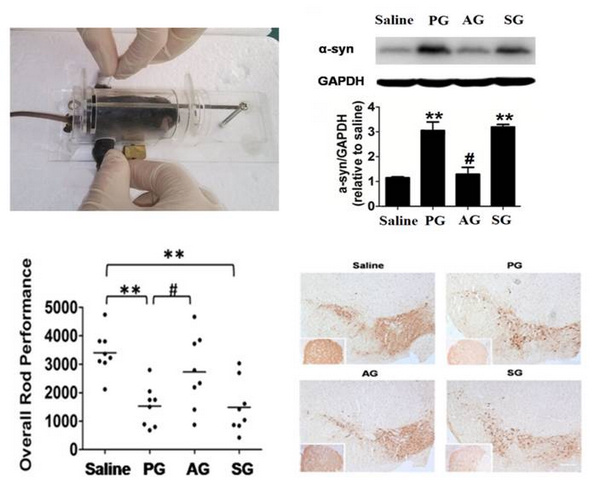Acupuncture promotes mTOR-independent autophagic clearance of aggregation-prone proteins in mouse brain
Acupuncture has historically been practiced to treat medical disorders by mechanically stimulating specific acupoints with fine needles. Despite its well-documented efficacy, its biological basis remains largely elusive. Recently,Tian Tian, Yanhong Sun, Jun Hu and Chunhai Fan from Shanghai Institute of Applied Physics, CAS and Huangan Wu, Jian Pei from Shanghai University of Traditional Chinese Medicine explored the regulating effect of acupuncture on autophagic level with Parkinson’s Disease mice model. This work was published in Scientific Reports, 2016, 6, 19714(doi:10.1038/srep19714).
They found that mechanical stimulation at the acupoint of Yanglingquan (GB34) promoted the autophagic clearance of α-synuclein (α-syn), a well known aggregation-prone protein closely related to Parkinson’s disease (PD), in the substantia nigra par compacta (SNpc) of the brain in a PD mouse model. And the protein clearance arose from the activation of the autophagy-lysosome pathway (ALP) in a mammalian target of rapamycin (mTOR)-independent approach. They further observed the recovery in the activity of dopaminergic neurons in SNpc, and improvement in the motor function at the behavior level of PD mice. Whereas acupuncture and rapamycin, a chemical mTOR inhibitor, show comparable α-syn clearance and therapeutic effects in the PD mouse model, the latter adopts a distinctly different, mTOR-dependent, autophagy induction process. Due to this fundamental difference, acupuncture may circumvent adverse effects of the rapamycin treatment. The newly discovered connection between acupuncture and autophagy not only provides a new route to understanding the molecular mechanism of acupuncture but also sheds new light on cost-effective and safe therapy of neurodegenerative diseases.

Figure 1. the effect of acupuncture on α-syn expression, the overall rod performance (ORP) scores and the TH-positive neurons
Contact
Fan Chunhai
Shanghai Institute of Applied Physics(SINAP),CAS
E-mail: fchh@sinap.ac.cn

